MAURI OLA
MAURI OLA
Contemporary Polynesian Poems in English
WHETU MOANA IIedited by Albert Wendt, Reina Whaitiri & Robert Sullivan First published 2010
This ebook edition 2013 Auckland University Press University of Auckland Private Bag 92019 Auckland 1142 New Zealand www.press.auckland.ac.nz
Introduction and this selection the editors Poems the contributors eISBN 978 1 86940 723 0 Publication is kindly assisted by
 National Library of New Zealand Cataloguing-in-Publication Data
National Library of New Zealand Cataloguing-in-Publication Data Mauri ola : contemporary Polynesian poems in English / edited by Albert Wendt, Reina Whaitiri and Robert Sullivan (Whetu moana ; II) Includes index. eISBN 978-1-86940-723-0 1. Pacific Island poetry (English). 2. Polynesian poetry20th century. 3.
PolynesiaPoetry. [1. Tuhinga krero. reo. 2. reo] I. reo] I.
Wendt, Albert, 1939- II. Whaitiri, Reina, 1943- III. Sullivan, Robert, 1967- IV. Series. 821.00808994dc 22 This book is copyright. Apart from fair dealing for the purpose of private study, research, criticism or review, as permitted under the Copyright Act, no part may be reproduced by any process without prior permission of the publisher.
Cover design: Keely OShannessy, based on paintings by Albert Wendt
Contents
INTRODUCTION
Whetu Moana, which we published in 2003, was the first anthology of Polynesian poetry in English edited by Polynesians and is now in its third imprint. In 2004 it won the Montana New Zealand Book Award for Reference and Anthology.
Whetu Moana is now used as a text in many universities and high schools throughout the world.
Whetu Moana speaks with many voices and reflects the great manao / tmanako / hopes / aspirations of our people who read and write poetry. We hope
Mauri Ola does that too. We attribute the success of the first anthology to many factors and with
Mauri Ola we hope to build on and reinforce those.
First, the anthologies serve a desire by Polynesians to share our struggles and achievements, our individual and collective everyday lives. In contrast to disempowering narratives of history and politics, they are a forum that bring our many voices together. In that sense, both Whetu Moana and Mauri Ola are collections from vulnerable yet enduring communities. Secondly, the poets, firmly rooted in the Pacific, are spread across Polynesia and the world. The poems discuss colonialism, sexism, jealousy, love of family, and respect for culture, elders and the past; they sit within a world view that does not exclusively consider human beings to be the most important species. Thirdly, the poets employ an astonishing range of Englishes and pidgins that have developed within the region, expressing the plurality of cultures, a wide range of voices, linguistic diversity, attitudes and approaches within Polynesia, which is a part of the much larger region now called Oceania.
Additionally, the poetry is complexly informed by the poetic, artistic traditions and innovations of Polynesians encountering local and global art developments, and influencing and being influenced by universal resistance movements. We cautiously use the term Polynesia, aware of its tainted history. We reclaim it as a term that invites discussion of commonalities and differences among ourselves and with other distinct groups within Oceania. For example, Polynesia is traditionally connected to Melanesia and Micronesia through ancestral and more recent family ties. As we said in the introduction to Whetu Moana, we take pleasure in noting and celebrating our differences both inside and outside the region. In this regard, we are delighted to see that Emelihter Kihleng and Dr Evelyn Flores are co-editing a forthcoming anthology of Micronesian writing.
Other oceanic anthologies edited by indigenous writers which fall outside the scope of this collection include the Macquarie PEN Anthology of Australian Aboriginal Writing, edited by Anita Heiss and Peter Minter, Vrua Tupu: New Writing from French Polynesia, edited by Kareva Mateatea-Allain, Frank Stewart and Alexander Dale Mawyer, and the Papua New Guinea journal Savannah Flames edited by Steven Winduo. The Pasifika Poetry website ( www. nzepc.auckland.ac.nz/pasifika ), a growing resource maintained by Dr Selina Marsh, contains texts and video interviews and readings by Fijian, Solomon Islands and Ni-Vanuatu poets, as well as Polynesians. The anthologies Lali and Nuanua, edited by Albert Wendt, survey Micronesian and Melanesian writing as well. When the idea of a second anthology was suggested, we were tempted merely to revise or update Whetu Moana, but because so much new poetry has been written and published since its completion, we decided to compile a completely new collection. The term mauri ola, or mauri ora, is found in most Polynesian cultures.
In combining the Mori mauri and the word ola, common in many Polynesian languages, the new pan-Polynesian title makes the anthology more inclusive of all our peoples. Mauri or mauli is the location of the emotions, usually the centre of the person: the moa (Smoan), the nau (Hawaiian), the ngkau (Mori). Ora or ola is life, to be alive. Together, mauri ola is the life force that runs through all things, gives them mana and holds them alive and together. Language is at the heart of every culture: it is what binds, defines and expresses the mind, heart, spirit and body of that culture, and it also reflects cultural changes and new directions. For us, poetry is the mauri ola of language: Tihei mauri ora! Look, we are still alive, we are still here! Despite the radical changes we have suffered, and are still undergoing, we are vibrantly alive and well and continue to define, to determine and to create ourselves and our destinies.
The poetry in this anthology expresses that loudly and proudly. As in Whetu Moana, we restricted the selection to poetry written in English because within Polynesia there are more than sixteen indigenous languages, plus French, English, Portuguese, Spanish, Hindi, Japanese and others. This meant we were unable to include the many significant French-language poets from French Polynesia. It was also difficult to select from the large and varied body of poems we received we could have filled many anthologies. As we note in Whetu Moana, English is now an important regional language of communication throughout Polynesia and the wider Pacific. Each Polynesian country has indigenised English and produced its own version of it: there are now many Englishes in our region, and many pidgins.
In Mauri Ola we have attempted to arrive at a selection of poetry that reflects that linguistic truth. The poets in the anthology come from many different island nations and languages that make up Polynesia. Some have chosen to use words and phrases in their own languages, which they feel is the best, and perhaps the only, way to express their feelings and ideas. Colonised peoples around the world are reconnecting with their native languages and those poets fortunate enough to have the knowledge take great pride in using them. Many of our languages are in danger of becoming extinct and we feel it is important to encourage their use. There is a select glossary giving meanings for the indigenous words and terms used in this anthology.
We have selected work by poets of a broad range of ages, from a pioneer generation of poets such as Hone Tuwhare, Alistair Te Ariki Campbell, J. C. Sturm, Arapera Hineira Kaa Blank, Bub Bridger and Rore Hapipi, to those who are still in their twenties, such as Chelsea Manaolana Duarte, Kiri Piahana-Wong, Christy Passion, Sage Uilani Takehiro, Tiare Picard, Kai Gaspar, Blaine Tolentino and Brandy Nlani McDougall. Sadly, many of our beloved pioneers have passed away over the last few years: Hone Tuwhare, Alistair Te Ariki Campbell, Arapera Blank and Jacquie Sturm. We dedicate this anthology to them, acknowledging their indefatigable struggle against racism and colonialism and to have our literature recognised nationally and internationally. We are greatly indebted to them, and thank them for the marvellous poetry they have bequeathed us.
Next page
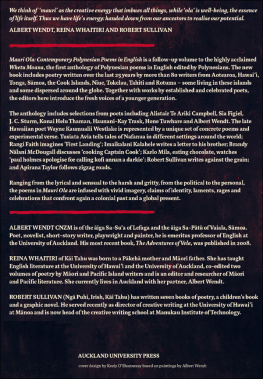
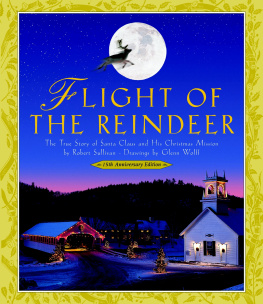
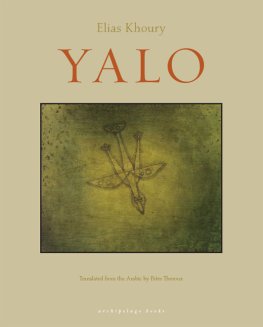
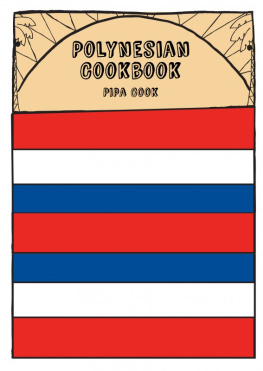
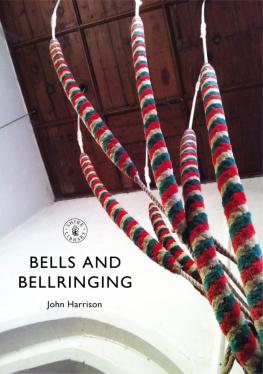



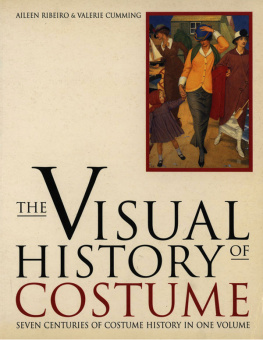
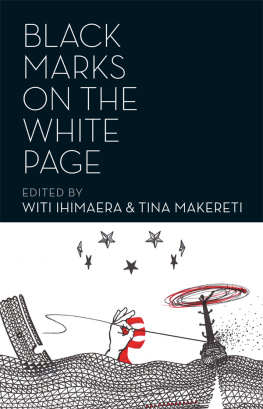



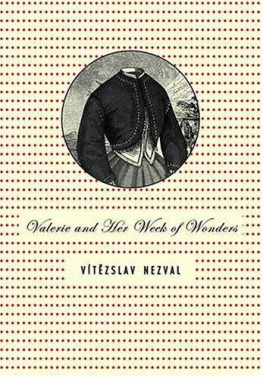

 National Library of New Zealand Cataloguing-in-Publication Data Mauri ola : contemporary Polynesian poems in English / edited by Albert Wendt, Reina Whaitiri and Robert Sullivan (Whetu moana ; II) Includes index. eISBN 978-1-86940-723-0 1. Pacific Island poetry (English). 2. Polynesian poetry20th century. 3.
National Library of New Zealand Cataloguing-in-Publication Data Mauri ola : contemporary Polynesian poems in English / edited by Albert Wendt, Reina Whaitiri and Robert Sullivan (Whetu moana ; II) Includes index. eISBN 978-1-86940-723-0 1. Pacific Island poetry (English). 2. Polynesian poetry20th century. 3.